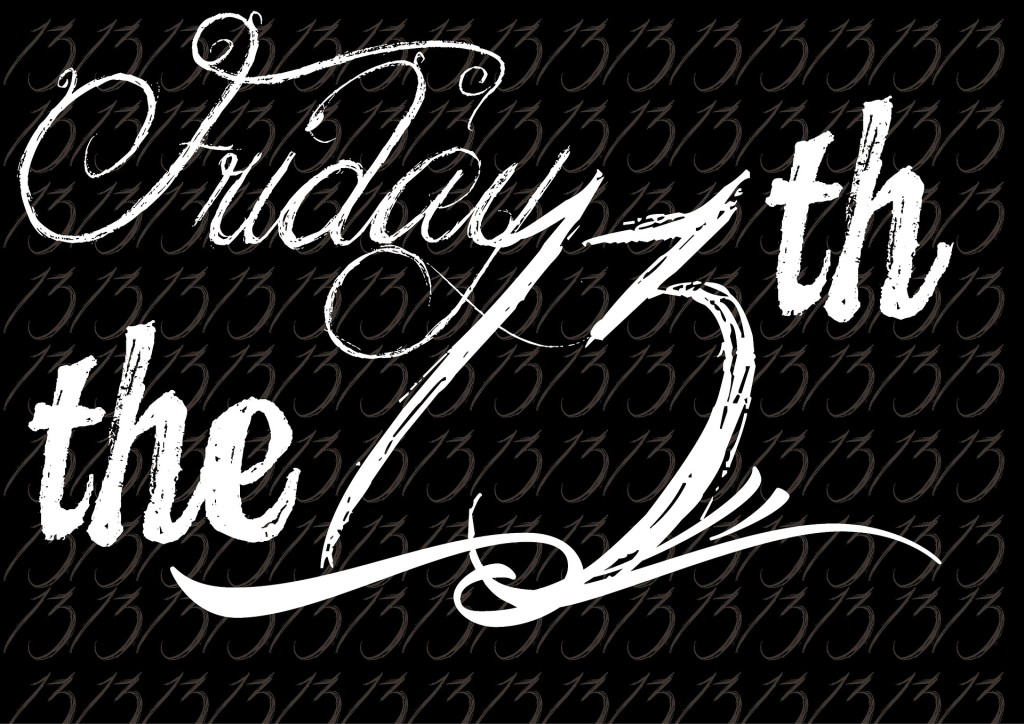Only 10 percent of the U.S. population truly believes anymore that “13” is unlucky. Where science rules, such as hospitals, buildings do have 13th floors. Still, brand-new hotels don’t have floors labeled “13” because it makes guests uneasy. Car racing won’t give anyone 13th place; it’s #12 and then #14. Some airplanes don’t have a 13th row. One international airline, Lufthansa, has no Row 13 and no Row 17 either, because in Brazil, “17” is the unlucky number. A terror of the numeral 13 is an actual illness called “triskaidekaphobia,” and author Stephen King suffers from it.

Fear of “13” is the Western world’s most common superstition. People fear “13” and especially Friday the 13th because 13 sat at the table at the Last Supper, and Jesus was crucified on a Friday. Youth have grown up with Friday the 13th slasher movies, the first one released in 1980. We’re told a name for a person or product is considered unlucky if it has 13 letters. How did a mere numeral get a bad reputation?
Most articles will say “13” is tainted by a connection with the occult, but don’t explain further. A rumor says that in old Europe 13 witches made up a coven. That “fact” was made up by folklorist Margaret Murray in 1921. For a century, scholars have been seeking proof of her assertion in testimonies of real and accused witches. They haven’t found a shred of evidence.
“13” Hasn’t Always Been Evil
If we go as far back as recorded history allows, a few millennia before the Last Supper, we find that 13 is a number associated with women. There are 12 solar months in a year but 13 lunar months of 28 days each, and this happens to match the average woman’s menstrual cycle. This synchrony seemed mystical or magical, and across all cultures femininity and mystery are associated with the Moon. But people could fear the numeral “13” only after numerals had been invented—about the year 3000 B.C., as far as historians can prove. So the fear of “13” is not a primal or prehistoric fear embedded in the human mind.
Nor is fear of “13” a universal fear. In Chinese, the number 13 combines two words that together sound like “definitely alive”; the unlucky number there is 4. In Hinduism, the 13th day of the month has the most potential for prosperity.
The author of a thorough and serious historical study called 13: The Story of the World’s Most Notorious Superstition, Nathaniel Lachenmeyer, has traced the very first mention of “unlucky 13” to the 17th century. It said that if 13 people sat around a table, one would die within the year, and the reason was because of the Last Supper’s seating. A 19th-century group calling itself “The 13 Club” deliberately sat 13 people around a table on the 13th of each month and then waited for any one of them to die within the year. They proved the “13 at the table” fear was groundless.
Friday has not always been an evil day. The sixth day of the Jewish week, it was established by God when He created for six days and rested on the seventh. Jesus was crucified on Friday because the Jewish elders wanted the execution and burial over with before preparations for the Sabbath began at sundown. If Friday is bad because Jesus died on a Friday, then the fear of Friday has a Christian origin—although Christians aren’t supposed to believe in superstitions. “Friday the 13th,” occurring about every seven months, was not a fearsome day until the 20th century. Yes, bad things have happened on Friday the 13th; you can find lists of them online. But you can also list things just as bad or worse happening on a Monday the 22nd or a Thursday the 9th, or any day.
Most of our weekdays are named after Norse gods, and Friday is “Freya’s day,” ruled by the Norse goddess of love and beauty, equivalent to the Roman goddess Venus. Most of these goddesses’ followers were, of course, women. Roman women ate and served fish on Fridays in honor of Venus, born from the sea, and the early Christians simply borrowed that tradition. (We still love and celebrate Fridays and enjoy Friday fish fries without thinking of deities at all.) Both Fridays and the numeral 13 are therefore associated with women, and that might be one reason patriarchal culture felt it ought to demonize them.
“Thirteen” is considered a neutral or even a lucky number in cultures other than ours. The Aztec week had 13 days; 20 such weeks made an Aztec year. In Italian, “to do 13” means “to win the lottery.”
It’s pretty clear that numerals of any kind don’t influence our luck for good or bad. If they did, by simply using numbers we could make our lives easier.
